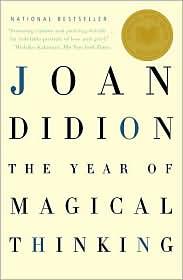
The Year of Magical Thinking
Joan Didion
Joan Didion attempts to make sense of the death of her husband and the incapacitation of her daughter.
Date Read: 2024-09-14
Recommendation: 4/5
Notes:
Confronted with sudden disaster we all focus on how unremarkable the circumstances were in which the unthinkable occurred.
The death of a parent, he wrote, “despite our preparation, indeed, despite our age, dislodges things deep in us, sets off reactions that surprise us and that may cut free memories and feelings that we had thought gone to ground long ago. We might, in that indeterminate period they call mourning, be in a submarine, silent on the ocean’s bed, aware of the depth charges, now near and now far, buffeting us with recollections.”
Given that grief remained the most general of afflictions its literature seemed remarkably spare.
I was born fearful, that some events in life would remain beyond my ability to control or manage them. Some events would just happen. This was one of those events. You sit down to dinner and life as you know it ends.
Why do you always have to be right. Why do you always have to have the last word. For once in your life just let it go.
Until now I had been able only to grieve, not mourn. Grief was passive. Grief happened. Mourning, the act of dealing with grief, required attention.
What would I give to be able to discuss this with John? What would I give to be able to discuss anything at all with John? What would I give to be able to say one small thing that made him happy? What would that one small thing be? If I had said it in time would it have worked?
If the dead were truly to come back, what would they come back knowing? Could we face them? We who allowed them to die?
I had not sufficiently appreciated it, a persistent theme by that stage of whatever I was going through.
Was it possible to feel anger and simultaneously to feel responsible? I know the answer a psychiatrist would give to that question. The answer would have to do with the well-known way in which anger creates guilt and vice versa.
What if I fell? What would break, who would see the blood streaming down my leg, who would get the taxi, who would be with me in the emergency room? Who would be with me once I came home?
He meant doing things not because we were expected to do them or had always done them or should do them but because we wanted to do them. He meant wanting. He meant living.
“Fritter away” was a definition in the crossword that morning. The word it defined was five letters, “waste.” Was that what we had done? Was that what he thought we had done? Why didn’t I listen when he said we weren’t having any fun? Why didn’t I move to change our life?
Grief turns out to be a place none of us know until we reach it.
Nor can we know ahead of the fact (and here lies the heart of the difference between grief as we imagine it and grief as it is) the unending absence that follows, the void, the very opposite of meaning, the relentless succession of moments during which we will confront the experience of meaninglessness itself.
Visible mourning reminds us of death, which is construed as unnatural, a failure to manage the situation.
“A single person is missing for you, and the whole world is empty,” Philippe Ariès wrote to the point of this aversion in Western Attitudes toward Death.
Self-pity remains both the most common and the most universally reviled of our character defects, its pestilential destructiveness accepted as given.
I never saw a wild thing / sorry for itself, D. H. Lawrence wrote, in a much-quoted four-line homily that turns out on examination to be free of any but tendentious meaning. A small bird will drop frozen dead from a bough / without ever having felt sorry for itself. This may be what Lawrence (or we) would prefer to believe about wild things, but consider those dolphins who refuse to eat after the death of a mate. Consider those geese who search for the lost mate until they themselves become disoriented and die. In fact the grieving have urgent reasons, even an urgent need, to feel sorry for themselves.
I am dropping my keys on the table inside the door before I fully remember. There is no one to hear this news, nowhere to go with the unmade plan, the uncompleted thought. There is no one to agree, disagree, talk back.
We are imperfect mortal beings, aware of that mortality even as we push it away, failed by our very complication, so wired that when we mourn our losses we also mourn, for better or for worse, ourselves. As we were. As we are no longer. As we will one day not be at all.
Time is the school in which we learn, / Time is the fire in which we burn: Delmore Schwartz again.
What had encouraged us to think that a resort hotel in Honolulu was the place to solve a cash shortfall? What lesson did we take from the fact that it worked?
The message was simple: You’re a professional. Finish the piece. It occurs to me that we allow ourselves to imagine only such messages as we need to survive.
I know why we try to keep the dead alive: we try to keep them alive in order to keep them with us. I also know that if we are to live ourselves there comes a point at which we must relinquish the dead, let them go, keep them dead.